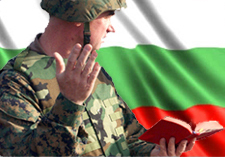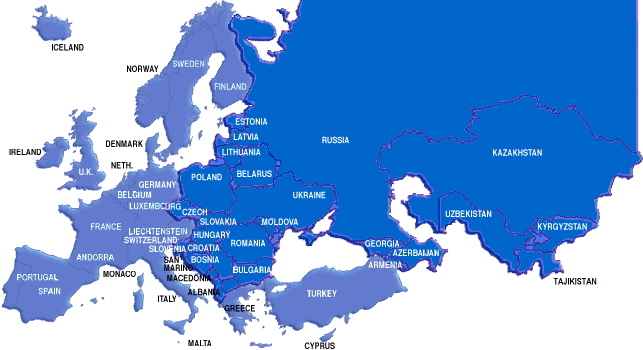Christian Dialogue Established
 Several months ago, in an article entitled “Orthodox Split Deepens” we reported that the Bulgarian Parliament had passed a controversial bill concerning religion. The problems with the legality of the new Confessions Act came into clash with reality when in July 2004 the police raided 250 Orthodox churches arresting several priests from the so-called Alternative Synod. Several developments have followed.
Several months ago, in an article entitled “Orthodox Split Deepens” we reported that the Bulgarian Parliament had passed a controversial bill concerning religion. The problems with the legality of the new Confessions Act came into clash with reality when in July 2004 the police raided 250 Orthodox churches arresting several priests from the so-called Alternative Synod. Several developments have followed.
As it becomes obvious that the new Confessions Act is already failing to respond to the social and spiritual needs of Bulgaria’s postcommunist context, it is unfortunate that its malfunctions prevent an atmosphere of religious freedom, pluralism and tolerance where everyone can experience the right to believe. Thus, the Bulgarian Confessions Act of 2002 cannot and should not be the legal text operating in Bulgaria when the country is accepted into the European Union.
The Act has shown itself insufficient and even harmful for the existence and practice of religion in Bulgaria, as well as to the right of every Bulgarian to freely choose to believe. None of the traditional confessions has experienced positive results from the practice of the Act , as it remains the only Bulgarian law that regulates personal convictions and conscience. In this sense, the Act clearly introduces and enforces discrimination.
The statements made by the Confessions Act’s authors and supporters that its principles of establishing state religion are not a precedent in Europe, but have been implemented and practiced in many Catholic and Protestant European countries is also invalid. The reason is simple and obvious. None of the said countries has passed through half a century of Communist Regime or has worked in a postcommunist context, where not only politics and economy, but the very mentality of the people has been flooded by totalitarianism creating a contemporary reality which has no Western European precedent.
The mentality of the Church is no different. Forced to be indifferent to politics under Communism, the Church remains distanced from culture and society to the point of a minority complex. In that oppressive context, the role and functions of the Church were imposed and strictly regulated by the government. As a result, today the church is failing to recover and reclaim its Biblical identity becoming simply a state institution with predetermined interest in strictly regulated areas of social life.
The Confessions Act of 2002 in Bulgaria attempts a return to an older autocratic style of government, turning the postcommunist Bulgarian context into a postcommunist regime. In the journey toward democracy such approach is without excuse. The state cannot and must not attempt regulatory interference in the rights of the church through the predetermined legality and the pressure of public opinion. It cannot and should allow tradition to dictate special privileges for any denomination. And when the state fails to be the initiator of actions against discrimination and oppression, the Church must and should assume this role.
After the unfortunate police actions, on October 18, 2004 the oppositional Democrats for Strong Bulgaria presented in the Parliament with recommendations for changes of the religious law. Less than a week later, perhaps as a response, the government announced the formation of a new special confessional commission. The commission will combine representatives from several government departments including Christian Dialogue (Continued)
internal affairs, finances and health. The idea strongly reminds of Kremlin’s Interreligious Council, but unfortunately does not include representatives of the religious denominations.
The search for a democratic paradigm which integrates religious freedom and freedom of conscience is not over either. Religious pluralism in Bulgaria will occur, unfortunately, in the already forming postmodern context. The time has come for the Bulgarian Church to rediscover its identity through revisiting its Biblical theology. There, common theological presuppositions presented within the faith of all Bulgarian Christians will lobby religious tolerance and create a healthy environment for the implementation of a new paradigm for ministry which successfully incorporates interdenominational partnership.
The first step toward such a paradigm may have been made as Orthodox, Catholic and Protestant believers came together on October 23, 2004. In an “Universal Character of the Christian Church” round table discussion they considered the possibility of the establishment of religious community where Christians from various denominations can come together for worship in freedom from fear and according to their religious convictions.
Group Work
Group work is an interesting phenomenon in and of itself. It even reflects scripture in that the Bible commands us to not forsake social gatherings. We are a being that will not function properly if left alone. Thus, simply being in a group setting provides for a reconstructive and supportive experience, which is needed for healthy development.
Some common themes of group work which appear to be most instrumental in producing change is of course being in relationship with others and then there is the concept of universality. Support groups provide to each member the feeling that he or she is not alone. Members in a group setting realize that their feelings which were once thought of as unique, are the same feelings that other members are experiencing. In knowing that one is not alone, he or she is able to take place in a reconstructive cognitive experience in which he or she is able to think more clearly on a particular issues. Being in fellowship with others, allows for us to become less self-centered and become more altruistic.
In being aware of the need for social support and in understanding that leading a group can be physically and emotionally consuming, a group leader must also realize the need to find support for him or her self. It is important to not take on the burdens of others if one is not able or ready to do so.
Chaplaincy in Bulgaria
 Since 1995, Cup and Cross Ministries International has worked toward a vision of the establishment of a Bulgarian Chaplaincy Association – an organization that incorporates pastoral care to prisons, military, police and hospitals. Our outreaches have been able to provide pastoral care and social services to the needy in a time of severe economic crises and political tensions. Our presence has been an answer for people in need for both physical and spiritual support. In the beginning of the 21st century, we are witnesses of a miracle as this vision comes into reality. Today, police and military officers participate in services led by the same ministers and pastors who once, during communism, they were ordered to arrest for the preaching of the Gospel.
Since 1995, Cup and Cross Ministries International has worked toward a vision of the establishment of a Bulgarian Chaplaincy Association – an organization that incorporates pastoral care to prisons, military, police and hospitals. Our outreaches have been able to provide pastoral care and social services to the needy in a time of severe economic crises and political tensions. Our presence has been an answer for people in need for both physical and spiritual support. In the beginning of the 21st century, we are witnesses of a miracle as this vision comes into reality. Today, police and military officers participate in services led by the same ministers and pastors who once, during communism, they were ordered to arrest for the preaching of the Gospel.
History of Events
In September of 1944 the Communist revolution took over Bulgaria. All prior Protestant activates were outlawed. Pastors and ministers were imprisoned. Some were brutally executed. Any attempt for ministry in public was equal to a death sentence. The church went underground for 45 years until the Fall of the Berlin Wall in 1989 and a Holy Ghost revival swept through the country. In the summer of 2000 the Bulgarian Church of God organized a chaplaincy seminar in the Military School in Veliko Turnovo. This was done with the partnership of NATO’s head chaplain along with the representative of the Orthodox Church in Bulgaria, the director of the school under the patronage of the vice-president of Bulgaria Mr. Kavaldjiev. More than 250 officers, spiritual leaders and civil representatives participated. The goal of the seminar was to awaken the interest of the community and appeal for changes in the Bulgarian constitution, which would guarantee the freedom of military personnel to access the chaplain’s services and care.
The Bulgarian Chaplaincy Association
In February of 2002 a chaplaincy seminar, organized along with the Church of God Chaplains Commission, was held in the National Palace of Culture in Sofia. More than 60 pastors, chaplains, students and church workers from different denominations attended. These were people actively involved in military, hospital and prison ministries. The seminar was a stepping-stone for the development of the chaplaincy ministry in Bulgaria. It served as a beginning point of the structural development of the department of chaplaincy and caregivers in the Bulgarian Church of God and facilitated to the establishment of the Bulgarian Chaplaincy Association of which Cup & Cross Ministries became a charter member.
Notes on a 30-day fast
 Day 1: Read Haggai 1-2. The fast has begun. I am waiting on the Lord. Fasting must be a great tool for God, if he calls us to do days and weeks of denial not only from food, but from the boundaries of economical and political systems, of human laws which demand food and of personal desires which starve and die when subjected under His command to fast.
Day 1: Read Haggai 1-2. The fast has begun. I am waiting on the Lord. Fasting must be a great tool for God, if he calls us to do days and weeks of denial not only from food, but from the boundaries of economical and political systems, of human laws which demand food and of personal desires which starve and die when subjected under His command to fast.
Day 3: I am not hungry at all. I feel a bit lighter and can actually feel my body cleansing itself. My resting while sleeping is even better than before and my mind is much clearer and focused. Read Song of Solomon 5:8.
Day 4: Still not hungry at all. Now, I understand how Jesus fasted for 40 days and hungered only after that.
Day 5: Read Matthew 27:3 and realized that the ones who betray do come back repenting.
Day 6: Read Matthew 27:7 and noticed the word “strangers.” I am a little bit hungry.
Day 8: God spoke to me face to face.
Day 9: God confirmed His word from yesterday. It has been awhile since I have been able in such a way to feel the heavens open with every second spent in the presence of God. I am not hungry at all.
Day 11: It is quite true that the flesh dies during fasting. But the dying of the flesh goes much further than the weakness of the body. Along with the flesh, die the desires of the flesh, and all human desires, along with the desire to hurt others when we are hurt and even the desire to be ourselves, until only the desire to be like Him remains in us.
Day 15: Not hungry. Read Isaiah 58 about fasting:
1. Is. 58:2 These were people who wanted to find God, but did not want to be found by Him, for when a person is found by God all human plans must be left behind in order for the will of God to be done.
2. Is. 58:3 Require all your things from God, may mean that they fasted with the intention to receive something from God, while God sees fasting as a way to bring His plans to realization.
3. Is. 58:4 Not the many words from v. 3, but their fasting was heard before God.
4. Is. 58:5 Definition of humbleness in fasting, which is clearly not passive but it is an action. This action is clearly defined by God with 8 verbs directed outward producing results around the person (v. 6-7), and 4 verbs directed inward producing results within the person (v. 13).
5. Contrary to all human understating not the proper foods, but the absence of food brings health (v. 8) and strength (v. 11).
Day 17: Woke up extremely hungry. Read Psalm 25. God spoke to me through Isaiah 43:5; I now understand what it means that a man shall live not by bread alone, but with every word of the Lord.
Days 26: A series of radical changes and answers to prayer occurred in unexpected ways – unexpected because they were not natural ways that one may anticipate or understand naturally, but rather supernatural and miraculous. Walls which had been built for decades fell and situation which had been developed for generations and centuries came together in a divinely inspired plan which changed the past, the present and will change the future. These were accompanied by heavy anointing during prayer which cannot be described except as an open channel of communication with God.
Day 27: As the end of the fasting approaches, the body feels more and more hungry. Brief blackouts and lack of balance become more frequent. However, prayer time has advanced into an absolutely clear line of communication. While attempting to pray with a certain list of needs, the Spirit audibly and visibly shows places, people, situations and plans for the future which carry meaning so higher that the prepared list of prayer needs seems inadequate in the presence of God. His plan becomes real and its reality is so strong that every other thought, feeling and even physical and emotion sensations looses meaning as one realizes their triviality and temporality in comparison with the supremacy and allness of God.
Struggling with the Past: Evangelicals in Postcommunist Europe (by Juraj Kusnierik)
The future is not what it used to be!’, shouted a Czech rock singer in 1990. He captured what many of us felt – the times have changed. Big banners proclaiming that ‘we are building a communist society’ were torn down from the façades of schools and factories. The alleged straight line of history – from capitalism through socialism to communism – was broken. Now, after six more years, most would agree that this line was nothing more than wishful thinking, an inverted utopia.
Solidarity trade unions in Gdansk, the opening of the western borders of Hungary, demolition of the Berlin Wall, and finally the Velvet Revolution in Czechoslovakia were not only political revolutions. The most significant change took place in our minds. A change so profound and sensitive that we are still too much ‘in it’ to evaluate it objectively. But we cannot avoid doing it anyway. It is like a piece of modern art – we have to see the frame to enjoy the picture.
Under communism modernity used to be identified with the Western world. Modern technology, modern fashion, modern music – although they had their ‘Eastern’ equivalents, those who wanted to be ‘really modern’ went for Western style (which was, for understandable reasons, usually not easy at all). Only after the regime that aspired to bring about the end of history came to an end, we discovered the obvious – that there could hardly be a more typical example of the modernistic project than communism with its ‘scientific atheism’, ‘historic materialism’ and social engineering. Modernistic assumptions had profound impacts on public life, culture, ethics and, to a very large extent, on the church. They are the shadows of the past, stretching over our largely post-modernist landscape, thus creating a unique blend of ‘post-communist post-modernism’.
What are the main characteristics of these times of transformation? Let me suggest some of them, dealing primarily with the church’s attitudes to the secular world.
Strong Authority Structures
The pastor of my church invited my friend and me for Sunday lunch. It was sometime in 1985, when some of us tried to communicate the gospel to our fellow university students. After lunch, this thoughtful and brave man said: “If the secret police question your activities, tell them that whatever you do (especially with regard to talking about God on the campus), you do because I asked you to do it. Tell them I am personally responsible for it.” This pastor created a space for evangelism, and bravely and without fear put himself into the position of responsibility before the state. However, in order to fulfill this responsibility, he had to be informed about all activities of all church members – including relationships with one’s boss or neighbours, family problems or one’s children’s performance in school. He often had his say when young people in the church were choosing their professions or education, and personally knowing some government bureaucrats, often helped them to get a good job or to be accepted at a university (for which one had to be politically screened). One of my friends – a very gifted violinist – had to study chemistry instead of music, because the pastor told him that to be a musician is not good for a Christian.
People in leading positions in church were well informed not only so that they could deal with the hostile government. They often assumed an extended control and power over the lives of their ‘flock’. Independent activity by church members was discouraged. The Church was more easily controllable when it was uniform and managed from one centre.
Some church leaders used their authority and power more wisely than others, but only a few could imagine a church without strong authoritarian leadership. It was both an impact of, and a reaction to the rigidly totalitarian structure of society. It was also an expression of anxiety and fear that the church would not survive into the next generation – which was what communist ideologists were saying, and Christians sometimes found it hard not to believe them. It is a paradox that many young people, growing up in evangelical churches, left them not because they lost faith, but because they wanted to protect their privacy and be free to make their own decisions.
Private Faith – Lack of involvement in Society
Most communist ideologists did not have much against ‘religion as such’. The problem arose as soon as religion critically spoke about ‘non-religious’ issues, especially politics. Christianity (or any other religion, for that matter) was tolerated if it stayed in one’s private sphere, or, in more liberal circumstances, in family or church. Keeping in mind the fact that there were times and places where one could end up in a concentration camp for just ‘being’ a Christian, it was a great improvement.
The division between public and private, with our religious affections belonging clearly to the latter, is deeply embedded in our minds. Of course, it was not communists who first came with this idea. It has been a central part of the modernist view of the world, however only the Communists had power to ‘design’ society accordingly.
Most Eastern European Christians accepted this division as one rule of the game. Several generations of Christians under the communist regime were taught they should be apolitical, they should use whatever opportunities to spread gospel. To be light and salt was understood almost exclusively as to give a good example by one’s behaviour.
Fear of Society – Minority Complex
The result of a lack of involvement in culture and society led to broken communication with non-religious people. The Church has not developed the language needed to communicate with those outside her own circles. Inability to communicate led to a fear of the non-Christian world. Believers tended to see themselves as a marginalized minority: with fixed rules, defensive attitudes, unwillingness to change, strong loyalty to the group, etc.. These were defensive mechanisms through which the minority has learned to survive and to keep its identity intact. One cannot say these are the result of persecution as they can be found where persecution does not exist; however, persecution certainly intensified the process.
There is a tension hidden in these attitudes. Evangelical Christians feel responsible for communicating the gospel to secular culture. They feel uneasy, if not threatened, when they have to step out of the safe environment of their churches. So they create ‘special events’, they try to export the church atmosphere and culture to the secular world, only to find out, by and large, that they talk to themselves again. This fosters their feelings of alienation from the world.
Modern Christians in Postmodern Culture
The three issues above – authority structures, privatization of faith, and fear of society – are, among others, marks of the strong influence that the communist version of modernity has had on our Christian community. Evangelical Christians have taken so many modernistic assumptions for granted that we often cannot tell the difference between them and our Christian convictions. While they might have helped us to survive red modernism, now it is over, they are now our burden.
The Church in post communist Europe finds itself in a period of profound transformation. Old authoritarian structures are not able to keep it together, An exclusive attitude to the world outside is no longer sustainable, defensive groups of believers are being marginalized even more.
Evangelical churches, especially their official establishments, are not very sensitive to these trends. Their main goal seems to be ‘to keep it as it is’. They hope for a major revival, with hymnbooks from the 19th century being taken from the shelves again, and enthusiastic evangelists ‘boldly preaching the Word’ on the streets. Why else would God have given us freedom?
There is a growing number of thoughtful people from all denominations who do not want to take either the assumptions of modernity or postmodernity for granted, who want to think them through and understand them, while, at the same time, re-discovering evangelical worship, community, spirituality and responsibility for public life. Whether in modern or postmodern culture, they want to seek a Christian alternative – so that the Gospel, and not our cultural assumptions would be the offence.
God gave us freedom. We did not deserve it. We enjoy it and we try to live and act responsibly. We hope God will bless us and help us in our time after modernity.
The Fire Bible in Bulgarian
 Bulgaria, a former communist country in Eastern Europe, is the focus for Bible Sunday 2003 purposing to provide the “Fire Bible” (also known as the “Life in the Spirit Study Bible,” formerly the “Full Life Study Bible”) in the Bulgarian language for pastors and lay workers in that nation of 8 million people. For the past decade and more, a Pentecostal revival has swept Bulgaria. Since 1989 when the communist era ended, the Pentecostal Assemblies of Bulgaria has grown from 35 churches to more than 600. It is the largest Protestant church in the nation! This growth has created a critical shortage of trained leaders. At this time there are only 100 trained leaders to lead the 600 churches. Therefore, deacons and lay workers who have little or no training are serving as pastors. “There are few books available to the Bulgarians to help them become better pastors,” says Kevin Beery, A/G missionary in Bulgaria. “The ‘Fire Bible’ with its Pentecostal study notes, commentary, concordance and many study helps is an all-in-one tool for the pastor who is doing his best to pastor a church without much training.” Kevin and his wife, Wendy, are managing editors for the Bulgarian “Fire Bible” project and have served nearly a decade in Bulgaria.
Bulgaria, a former communist country in Eastern Europe, is the focus for Bible Sunday 2003 purposing to provide the “Fire Bible” (also known as the “Life in the Spirit Study Bible,” formerly the “Full Life Study Bible”) in the Bulgarian language for pastors and lay workers in that nation of 8 million people. For the past decade and more, a Pentecostal revival has swept Bulgaria. Since 1989 when the communist era ended, the Pentecostal Assemblies of Bulgaria has grown from 35 churches to more than 600. It is the largest Protestant church in the nation! This growth has created a critical shortage of trained leaders. At this time there are only 100 trained leaders to lead the 600 churches. Therefore, deacons and lay workers who have little or no training are serving as pastors. “There are few books available to the Bulgarians to help them become better pastors,” says Kevin Beery, A/G missionary in Bulgaria. “The ‘Fire Bible’ with its Pentecostal study notes, commentary, concordance and many study helps is an all-in-one tool for the pastor who is doing his best to pastor a church without much training.” Kevin and his wife, Wendy, are managing editors for the Bulgarian “Fire Bible” project and have served nearly a decade in Bulgaria.
Revival Harvest Campaign 2004
 October 1, 2004 marks the beginning of Revival Harvest Campaign 2004. The purpose of the campaign is to reach lost souls and to enhance the ministry of local congregations through prayer and preaching. We appreciate the response from all churches who participated in the Revival Harvest Campaign last year. If you would like us to schedule a service with you, please contact us by clicking here.
October 1, 2004 marks the beginning of Revival Harvest Campaign 2004. The purpose of the campaign is to reach lost souls and to enhance the ministry of local congregations through prayer and preaching. We appreciate the response from all churches who participated in the Revival Harvest Campaign last year. If you would like us to schedule a service with you, please contact us by clicking here.









